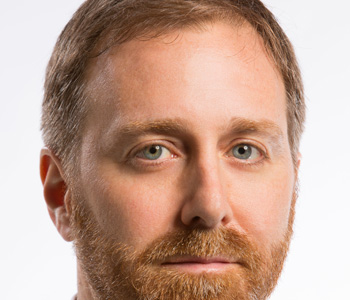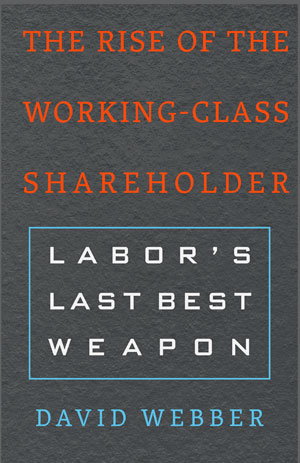
The Rise of the Working-Class Shareholder tells the story of labor’s unheralded shareholder activism. That activism weaponizes the $3 trillion in labor’s capital, which is vested in the pensions of state and local government workers and unionized private sector workers, to advance the interests of their worker-contributors. The activists who do this work are almost totally invisible. But it is crucial to tell their story now, in a bleak time for labor unions and other working-class institutions. The purpose of the book is not to cheer up otherwise depressed labor advocates, though it does offer a rare glimpse into activists fighting and winning assorted confrontations with companies, hedge funds, private equity funds—all, using shareholder power. In telling their stories, my aim is to demonstrate how and why shareholder activism is a critical tool for workers to advance their interests in the twenty-first century. Workers should have more capital than they do, more ownership than they do. But, at the same time, they already have enough through their pension funds to meaningfully bend all-powerful global capital markets in their direction. Three-quarters of the book are dedicated to proving that proposition, primarily by telling the stories of these invisible activists.
That said, the book also offers two critically important legal and policy takeaways. The first relates to the question of what types of factors these pension funds should consider in making investments. The second major takeaway relates to pension reform. There is an extremely well-funded, comprehensive, right-wing attack on public pension funds in particular that has been going on for some time. That campaign, financed by the Koch Brothers, the Arnold Foundation, and others, aims to break up these pension funds and convert them into tens of millions of individually managed 401ks or the like. If successful, that will kill the activism described in the book. Labor’s shareholder activism is dependent on the existence of large, pooled sources of workers’ capital, like the California Public Employees’ Retirement System ($350 billion in assets) or the California State Teachers’ Retirement System ($225 billion) or New York City’s pension funds ($190 billion). Convert those into individually managed accounts, and these funds become like the rest of us 401k holders, atomized and unable to protect ourselves. I analogize a pension fund to a union, and a 401(k) to “right to work”. A pooled pension fund speaks with a powerful collective voice. I believe the subversion of that voice is a key aspect of pension reform. Such reform is not just about the question of underfunding. It is a form of economic voter suppression designed to silence working-class shareholder voice; voice that is critically dependent upon being collective.
In making these arguments, I also aim to overcome the objections of some ideological purists who view labor’s capital as inherently compromising. Does labor’s capital occasionally lead labor to act against its own interests? It certainly does. I offer examples of this and address them squarely in the book. But to me, to abandon labor’s capital because of these conflicts is like abandoning powerful unions because they grew too close to the power structure, or, giving up on electoral politics because of its inevitable compromises. The key is to master these problems through training and raising awareness that can tip the balance in labor’s favor.
None of this means that labor’s capital is the solution to all of labor’s problems. Traditional tools like legislation, litigation, electoral politics, and organizing still matter. But in my view, capital markets are the most powerful force on the planet. The facts on the ground are often established there. By the time you’re getting to your election or legislative drive, it is often too late. Worker voice needs to be heard in the markets themselves, and these funds are the mechanism for projecting that voice.
I backed into this topic, largely by accident. I began my legal career litigating corporate and securities cases at a New York law firm. I recall commiserating with a friend at my fifth-year law school reunion, saying we’d rather be suing our clients than representing them. Shortly thereafter, I switched to a plaintiff-side class action firm that brought securities fraud lawsuits—cases like Enron, WorldCom, or today, Wells Fargo—on behalf of investors. Many of the clients of the firm were public pension funds and labor union funds. There would be court hearings or settlement negotiations, and in the middle of this very Wall Street world of bankers, lawyers, and accountants, you’d have teachers, firefighters, union leaders on behalf of their defrauded pension funds. They impressed me, both with their skills, the seriousness of purpose that they brought to the task, and their motivation. I found their perspectives to be a very welcome breath of fresh air. They were the only folks in the room to whom the outcome really mattered in a direct and personal way, and they injected that perspective into the work.
When I entered academia, I spent a few years closely studying the litigation behavior of these funds. They played a very productive role bringing fraud and deal suits. From there, my interest in their role as investors expanded quickly. Their investor activism operated on many fronts, and I increasingly developed the conviction that they were an extraordinarily important voice for working-class and middle-class people whose interests were being increasingly ignored by the most powerful institutions in our society. I began attending conferences of pension trustees and inviting activists to my seminar on “shareholder activism.” I wrote the book to tell their story, to point out the legal and political challenges they face, and also the great potential of their work, particularly in an age when capital markets are so ascendant.
My book picks up a conversation that began in the 1970s, usually credited to Saul Alinky’s Rules for Radicals. In that book, Alinsky advocated what he called the “proxy tactic.” He offered an early example of this kind of shareholder activism, in which he and others led a proxy campaign, using the shareholder voting power of churches and others, to push Kodak to act on racism and economic inequality in Rochester, New York, the company’s headquarters. Two other noteworthy books followed in the late 1970s—Peter Drucker’s The Pension Fund Revolution and Jeremy Rifkin and Randy Barber’s The North Will Rise Again—both of which discussed the prospects for worker-based pension power. Since then, there have been several academic treatments of the topic, in both book and article form. Economist Teresa Ghilarducci has been a noteworthy contributor to that debate. I think my book advances this whole line of thought both by reassessing fiduciary duty in light of twenty-first century challenges, and by reframing the pension reform debate as one not just about paying workers but about shareholder voice and shareholder power.
My book begins with a largely forgotten California strike that took place at Safeway supermarkets in 2003-04. At first glance, the basic arc of that story is a familiar confrontation between a company, Safeway, and a labor union, the United Food and Commercial Workers union (“UFCW”). Shortly after taking over as Safeway CEO, Steven Burd launched a disastrous acquisition campaign, buying up several supermarket chains. When those acquisitions turned sour and the company began bleeding cash, Burd tried to cut worker compensation to plug the gap he created. He took a hardline with workers and their lead negotiator, the UFCW’s Sean Harrigan. After a five-month strike, the company and the union reached an agreement that was highly favorable to the company. Safeway won, it seemed.
But something surprising immediately followed the strike, a development that sits at the core of my book. Several fed-up worker pension funds, including the California Public Employees Retirement System—of which Harrigan was president—launched a shareholder campaign to unseat Burd and replace several of the board members that blindly backed his course of action. The partial success of that unusual shareholder revolt, led by worker funds, is the starting point for my book. I think it anticipates many of the developments with working-class shareholder activism in the ensuing fifteen years, up until today. It also lets a reader compare the costs and benefits of a strike with the costs and benefits of a shareholder campaign, with both having taken place in one setting, over one set of issues, albeit framed in different ways. I think someone who cares about worker issues and economic inequality but knows little about shareholder activism can see its potential in this one episode. The book then follows up the Safeway story with those of the activist generation following Harrigan, which I think refined and improved upon those tactics to further advance worker shareholder power.
Everyone is trying to come up with ideas on how to reinvent labor in the twenty-first century. I hope my book will make the use of working-class shareholder power a core part of that discussion. I hope union leaders will invest in it. I hope progressives will rally to protect and defend the pensions that enable this power. I hope that policymakers will think carefully about how to nourish the deployment of capital by workers for workers. I hope that students might consider this work for a career. I also hope it will influence academics and others to think carefully and strategically about how to reshape markets from within.


David Webber is the author of The Rise of the Working-Class Shareholder: Labor’s Last Best Weapon, published by Harvard University Press and featured in his Rorotoko interview. He has also published scholarly articles including “The Use and Abuse of Labor’s Capital” in the New York University Law Review and “The Plight of the Individual Investor in Securities Class Actions” in the Northwestern University Law Review. Webber has presented his research at the Harvard Stanford Yale Junior Faculty Forum, the Conference on Empirical Legal Studies, and the American Law and Economics Association conference, among others. He has published op-eds in the New York Times, the Washington Post, the Chicago Tribune, the Los Angeles Times, and Reuters. He has been interviewed by television, radio, and print media, including Nightly Business Report, NPR’s Marketplace, Bloomberg Radio, The Majority Report with Sam Seder, The David Pakman Show, Knowledge@Wharton Business Radio, CSPAN’s BookTV, Agence France-Presse, Reuters, and others. Webber is the winner of Boston University School of Law’s 2017 Michael Melton Award for Teaching Excellence. He is a graduate of Columbia and NYU Law School, where he was an editor for the law review.